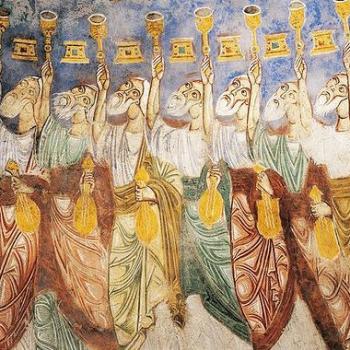The Most Pernicious and Pervasive Heresy (within American Christianity)
It’s not what you expect. In fact, most people would never even recognize it. It’s so pervasive (at least in American Christianity) that it’s hardly ever noticed. I suspect, however, that if a first century apostle or second century church father came among us it would be one of the first things they would notice—and condemn—about our “Christianity.” It’s not a formal heresy like “Arianism” or “Pelagianism.” It’s a mostly unconscious heresy that we have fallen into without thinking about it. But if you were to step back and away, especially if you were able to take a space ship to the moon, so to speak, and look down at American Christianity from a large distance, it would stand out like the Great Wall of China. In other words, as long as you are immersed in “American church life” you don’t see it; I suspect only missionaries to us from foreign lands can really tell us who we have become and what we have done to authentic Christianity.
Years ago Presbyterian sociologist of religion Dean Hoge (Catholic University of America, d. 2008) wrote this about American Christianity:
“For the typical Protestant church member middle class commitments to family, career, and standard of living are so strong that the church commitment is largely instrumental to them and contingent on whether the church appears to serve them. As a result, many local churches tend to become instruments for achieving middle class interests, whether or not these interests can be defended in New Testament terms.” (I wrote this quote down on a three-by-five card years ago and have it still, but unfortunately I did not write down its source. My possibly mistaken memory is that it was published in Christian Century.)
Of course there are many exceptions, but, in my experience, they are rare. Most American “church people” look for a church that will entertain and comfort them. As soon as it challenges their most basic values and lifestyles, they either protest or leave.
Here is the heresy I’m talking about most clearly and prophetically stated by Karl Barth himself:
“When the gospel is offered to man, and he stretches out his hand to receive it and takes it into his hand, an acute danger arises which is greater than the danger that he may not understand it and angrily reject it. The danger is that he may accept it peacefully and at once make himself its lord and possessor, thus rendering it innocuous, making that which chooses him something which he himself has chosen, which therefore comes to stand as such alongside all the other things that he can also choose, and therefore control. … Wherever the gospel is proclaimed…it is exposed at once to the danger or respectability.” (Church Dogmatics II/1, p. 141)
Can we give the heresy a name? I think so: the desire for respectability and domestication of the gospel and the church. If you need a single word, then I suggest “respectabilism.” We want our churches to be respectable.
Do I need to detail the ways in which respectabilism appears?
In my opinion, the main way is that we expect our pastors (and other Christian leaders) to comfort, encourage and support us and never seriously challenge us to the core of who we are. Most pastors know very well that if they do that, their job will be in jeopardy.
Another way is the influence of money and power in church life. Churches usually choose successful businessmen to be their lay leaders and they are not always the most spiritually-minded people of the congregation.
Yet another way is “professionalism” in worship. Many churches hire people, whether Christians or not, to sing in their choirs, play their organs, etc. Appearance and polished performance become more important than real Christian community (participation) and spirituality. Ordinary people of little beauty or talent are rarely, if ever, asked to participate “up front.” How far we have wandered away from 1 Corinthians 14:26!
Finally, many pastors and their congregations feel the need for the pastor to be known as “Dr. So-and-So”—whether he or she has an earned doctoral degree or not. I often see pastors’ names on church signs with the honorific title “Dr.” before them and know the pastor does not have an earned doctoral degree from any reputable institution of higher education.
I’m sure there are many other manifestations of respectabilism in American Christianity. And I’m sure there are many churches and Christian organizations that are not guilty of it. However, in my opinion (and I know in that of many observers of American Christianity), it is a common feature of American Christian church life.















